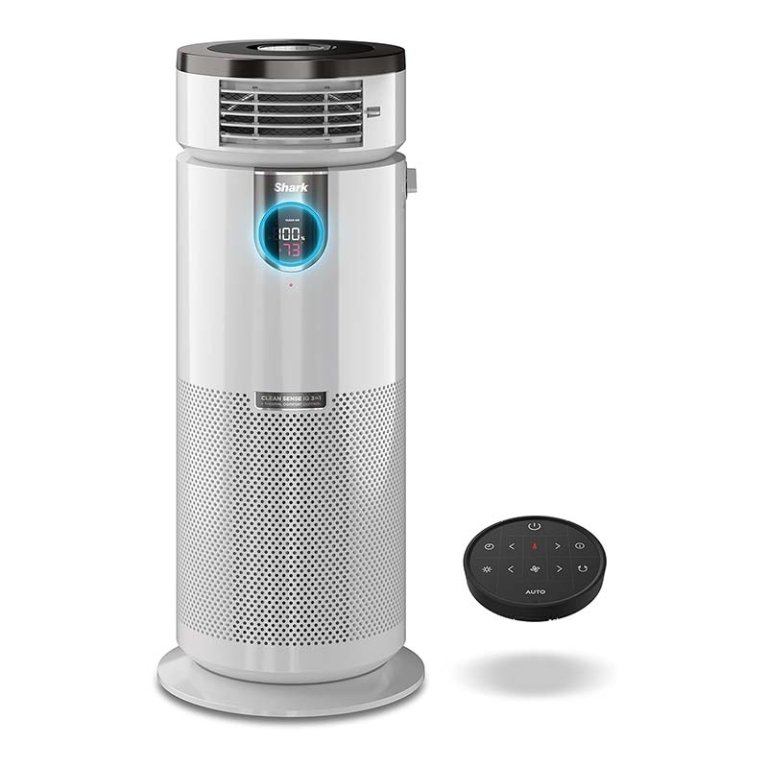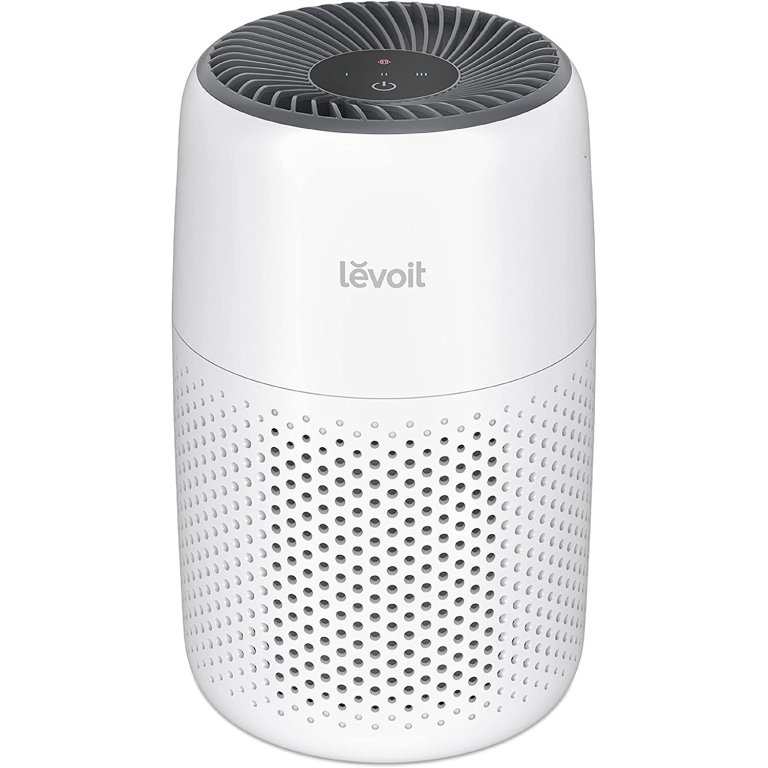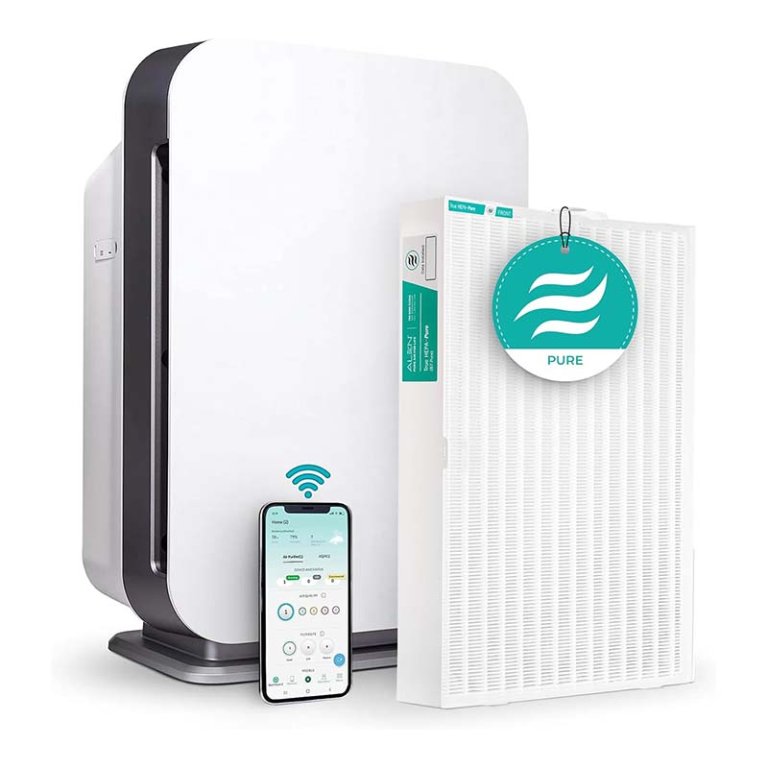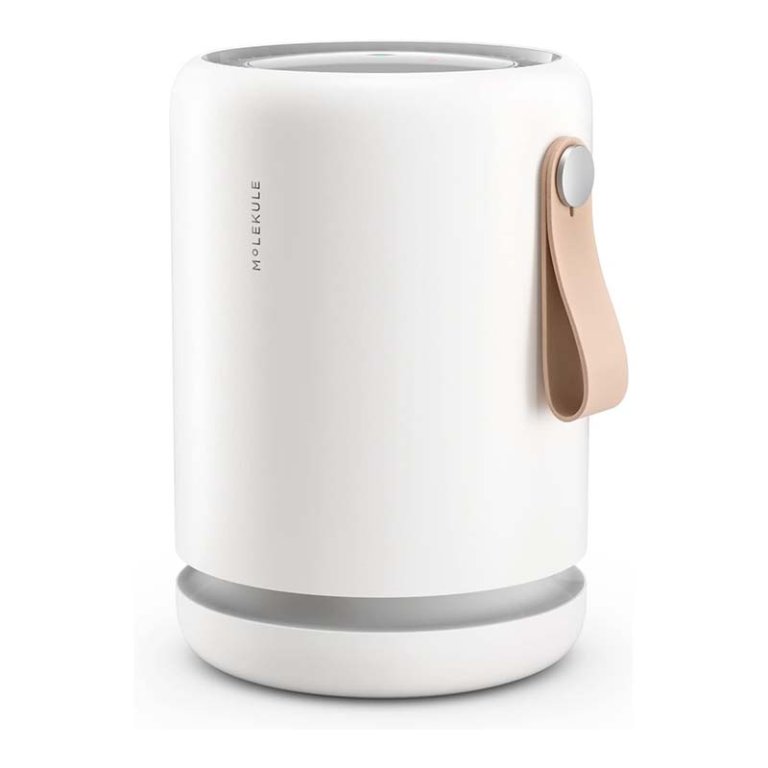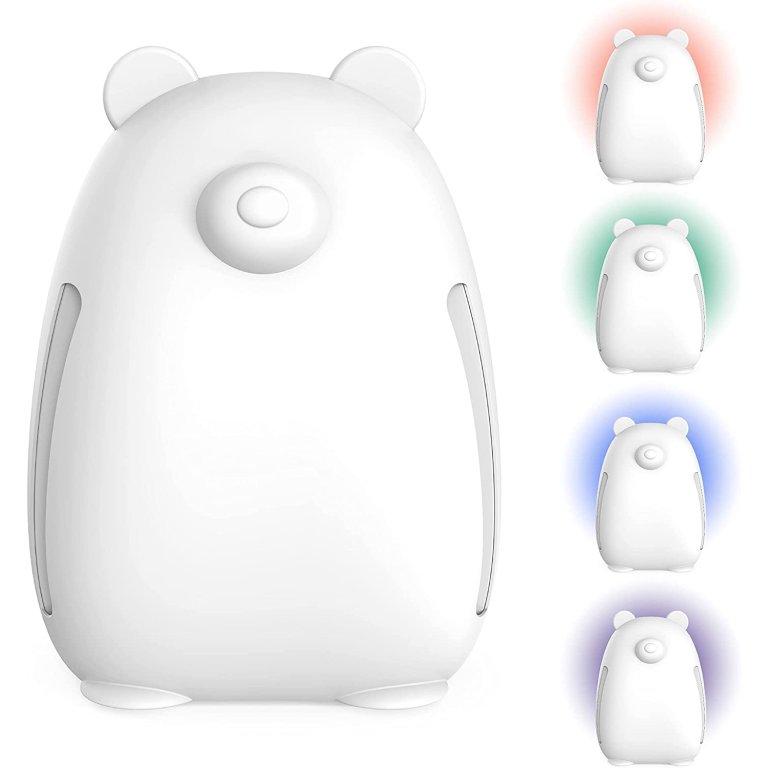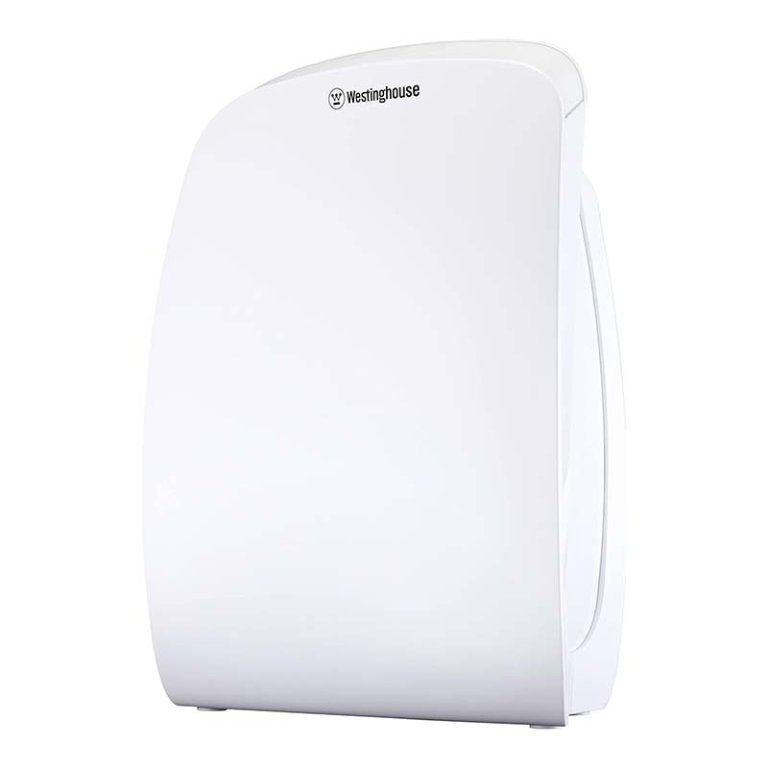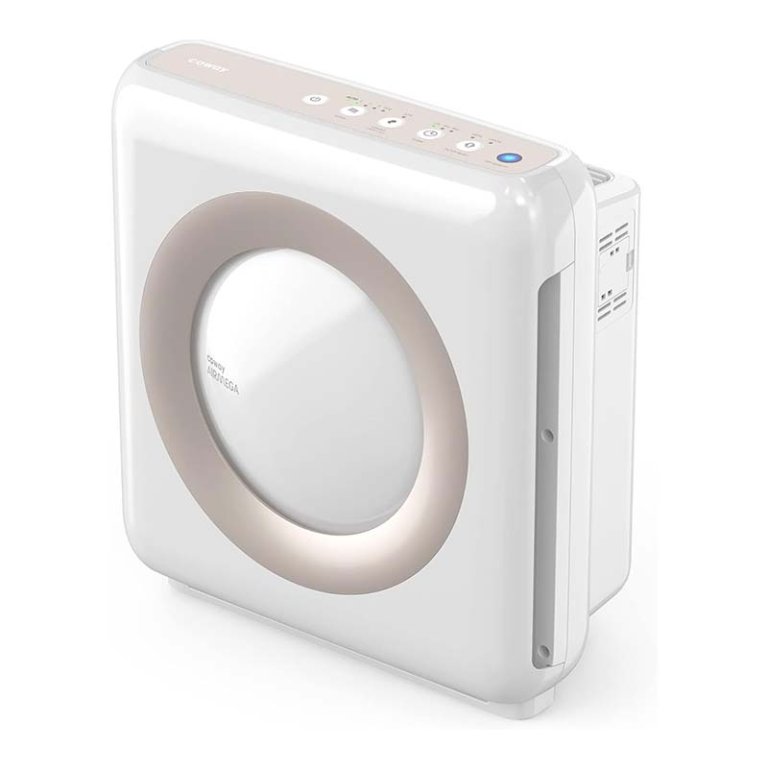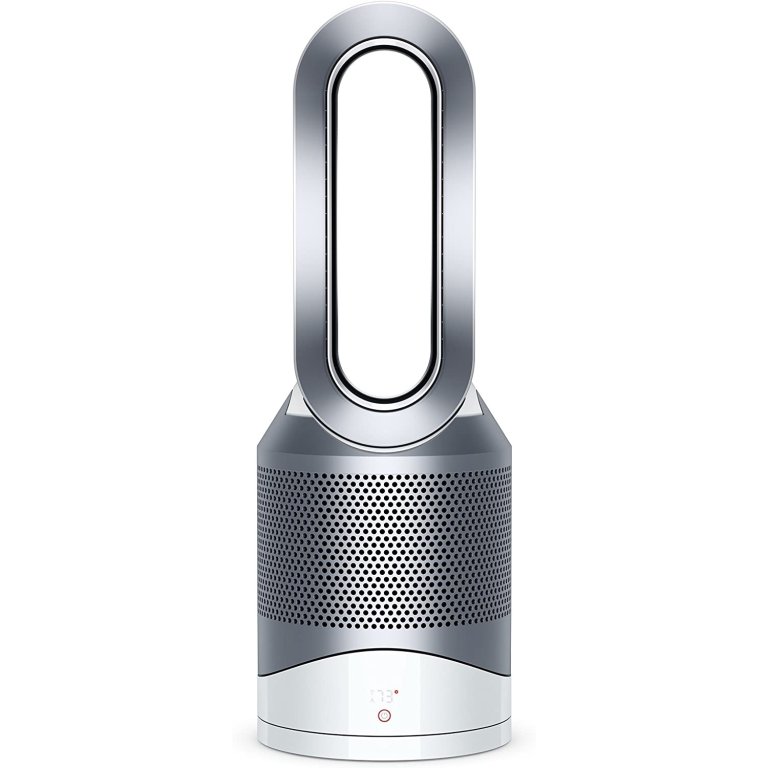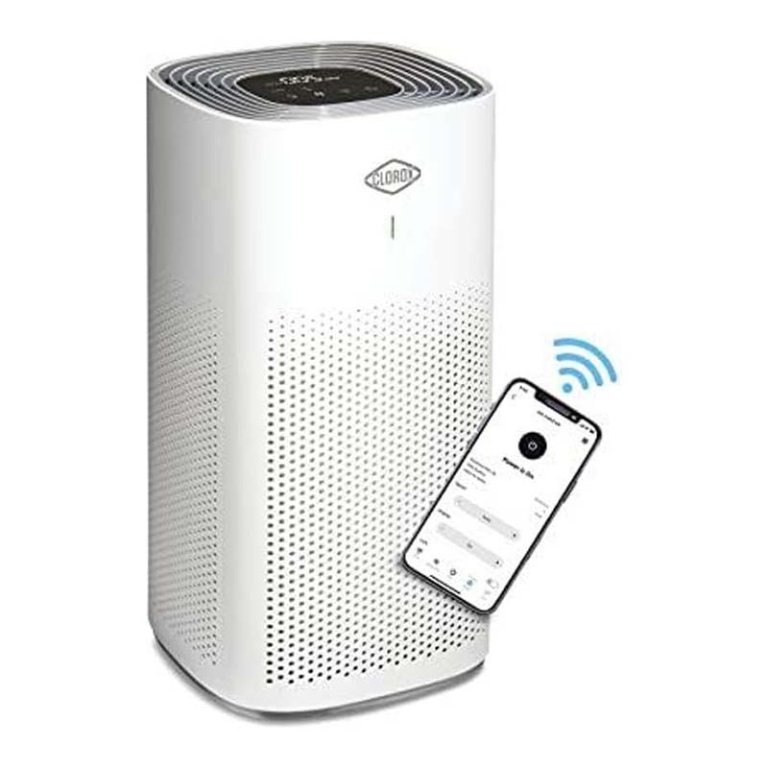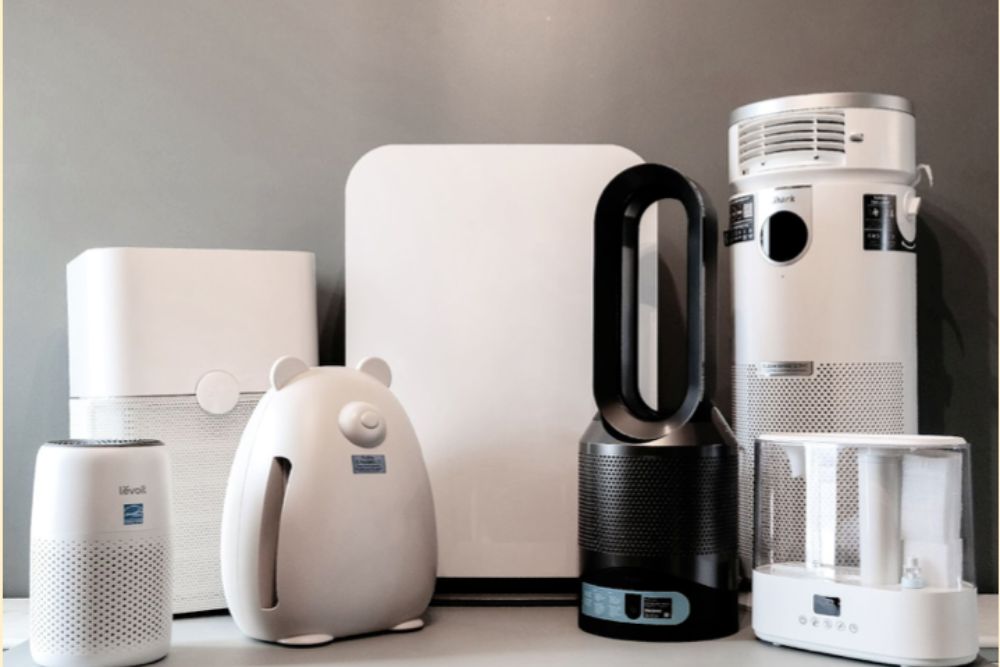
We may earn revenue from the products available on this page and participate in affiliate programs. Learn More ›
As consumers become more aware of the airborne pollutants that lurk in their homes, the demand for quality air purifier reviews increases. Technology changes quickly, even in air purifiers that operate on basic principles, so we carefully tested 12 of the most popular models on the market in real-world scenarios to help you find the right one.
Members of the Bob Vila testing team selected a dozen of the best-selling air purifiers available and then tested their abilities to remove dust, pet dander, pollen, smoke, and more. Our goal was to determine whether the purifiers would remove the most common types of household airborne pollutants, so we created test cubicles out of our closets. There, we introduced airborne pollutants and used air-quality monitors to see how quickly the purifiers removed them from the air.
Ahead, learn what features to look for when shopping for an air purifier and discover how the following 10 models earned a spot in our lineup. Find out our tests’ results—pros and cons—before selecting the best air purifier for your home or office.
- BEST OVERALL: Shark HC502 3-in-1 Air Purifier With NanoSeal HEPA
- BEST BANG FOR THE BUCK: Levoit LAP-C161-WUS Core Mini Air Purifier
- BEST FOR LARGE ROOMS: Alen BreatheSmart 75i True HEPA Air Purifier
- BEST FOR SMALL ROOMS: Molekule Air Mini+ Air Purifier
- BEST FOR KIDS’ ROOMS: Pure Enrichment PureBaby Bear HEPA Air Purifier
- BEST MEDICAL-GRADE: Westinghouse 1701 NCCO Air Purifier
- BEST FOR SMOKE: Coway Airmega Mighty Air Purifier
- BEST CLIMATE CONTROL: Dyson Pure Hot + Cool Link HP02 Air Purifier Heater
- BEST FOR GAS STOVES: AirHood Wired Kitchen Air Cleaner
- ALSO CONSIDER: Clorox Alexa Smart Medium Room True HEPA Air Purifier
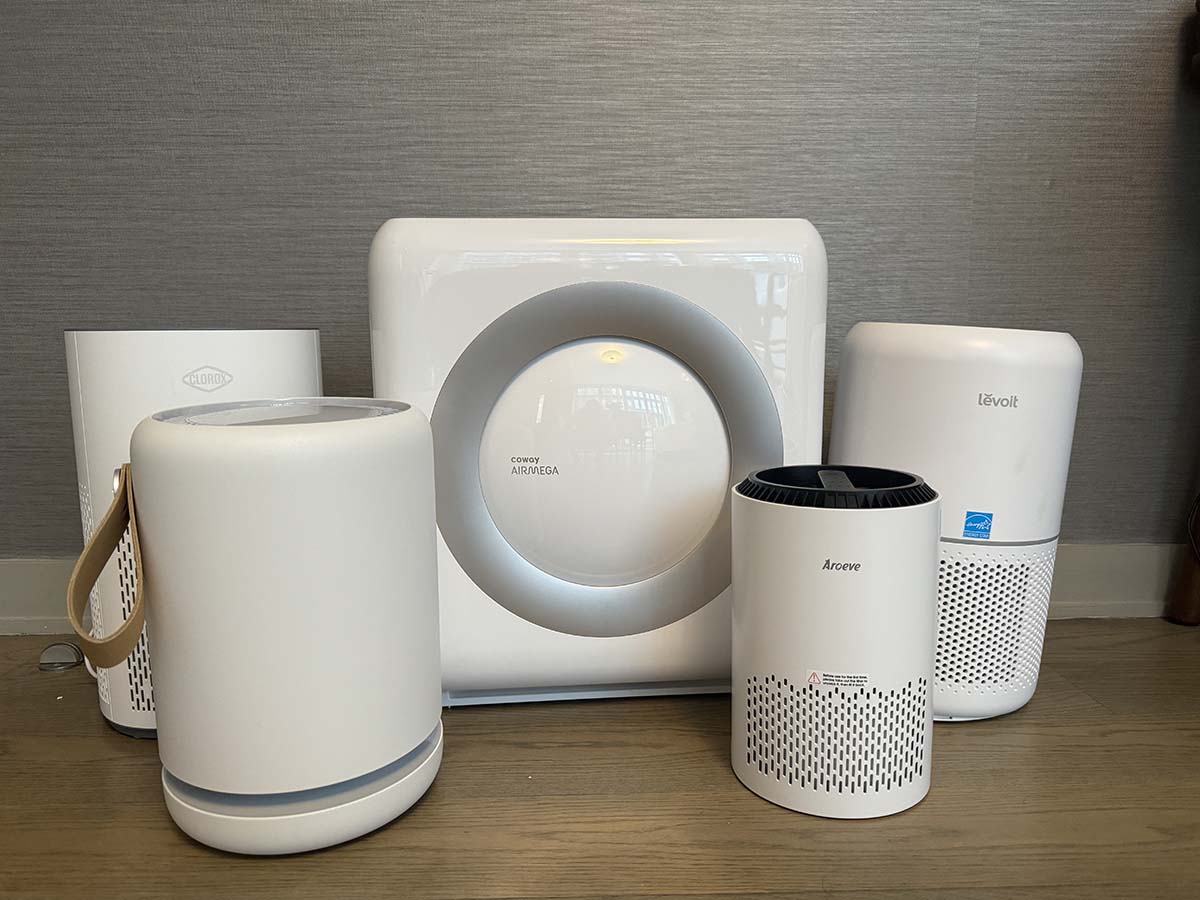
How We Tested the Best Air Purifiers
We quickly discovered dozens of manufacturers were marketing air purifiers and we wanted to test the best ones from several categories. We considered brand names like Dyson, Shark, and Westinghouse, which are widely known and well respected. Still, we didn’t automatically eliminate smaller or niche brands if they had highly satisfied customers. We then narrowed our test list to a dozen of the highest-rated models.
For testing, we cleared out a closet and then wiped down the floors, walls, and ceilings to ensure they wouldn’t contribute to the dust in the spaces. We tested each air purifier—one at a time—by placing it in the closet alongside an air-quality monitor. We introduced airborne particulates by shaking dirty rugs over the devices, and then we took air-quality readings every 30 minutes to see how quickly the purifiers eliminated the pollutants.
Our smoke test was pretty smelly—we lit five incense sticks in the closet, gave the smoke a chance to infiltrate the space, and then started the air purifier and took a reading. We closed the door to let the purifier do its thing and continued to take readings every 30 minutes.
In later tests, we installed the air purifiers in a regular New York City apartment with exposure to common household irritants like smoke, outdoor air pollution from open windows, pet dander, and general dust. We also used incense and dust collected from a vacuum bag to test the filter’s ability to remove visible pollutants from the air.
For these air purifier reviews, we scored each product on a scale of 1 to 5, taking into account ease of use, effectiveness, noise, and value. We also took into account the build quality and overall aesthetic appeal of each product. At the end of testing, we added and averaged the scores and used them to determine each air purifier’s stand-out strengths and which one was truly the all-around best.
Our Top Picks
After hours of testing the purifiers through exposure to a range of common household air pollutants, we found that the following air purifiers excelled. While they vary in type, cost, and design, each is well suited for removing airborne pollutants in the home.
During testing, we noted their best and not-so-good features. (But don’t limit yourself to only the models on our list of the best air purifiers; we also constructed a DIY air purifier out of materials and supplies you may already have around the house. Check it out below, too.)
Best Overall
Shark HC502 3-in-1 Air Purifier With NanoSeal HEPA
What We Like
- Unit features a heating element for warm purified air
- Digital readout shows the overall freshness of the air in the room
- Comes with a remote control and oscillates for better coverage
What We Don’t Like
- The purifier is relatively loud when operated on the highest power level
Product Specs
- Dimensions: 29.52 inches tall by 12.59 inches in diameter
- Remote control? Yes
- Functions: Air purifying, fan, heating, oscillating
This Bob Vila Approved product carries our brand’s highest level of recommendation.

Bob Vila Approved recognizes the household and DIY products that impressed us most in our real-world testing and that exemplify core values of the Bob Vila brand, including craftsmanship, innovation, and value for the dollar. Winners of this designation come recommended by our professional review team and are personally approved by Bob Vila.
Our Ratings: Overall 4.5/5; Ease of Use 5/5; Effectiveness 5/5; Noise 4/5; Value 4/5
The Shark three-in-one air purifier offers three distinct functions: purified air, heated air, and purified fan breeze. Other perks include a remote control and an oscillating feature. We tested the HC502 model, which is designed for rooms up to 1,000 square feet and features a base plate that helps stabilize the unit and reduce the risk of tipping. In our tests, it cleared particulates in just 30 minutes and a large amount of smoke in just 60 minutes. To test its ability to clear particulates, we shook a dirty rug above it, and once our air-quality monitor registered the dirty air, we turned on the Shark and closed the closet door. At our first 30-minute check, the air quality in the test closet had already dropped to safe levels. Impressive. To test the Shark’s prowess for clearing smoke and odors, we filled a closet full of incense smoke. We turned on the Shark and let it run for 30 minutes before checking it again. At the 30-minute mark, the levels were still elevated but only slightly. At our second 30-minute check, the levels were back in the safe zone, and the smell had significantly improved. The only downside we found is that it generated 59 decibels of noise on High, comparable to the sound of riding in a car going 60 miles per hour. On Low, it registered a whisper-quiet 28 decibels, perfectly reasonable at any time. This powerhouse of a purifier can help any home maintain safe—and fresh—air quality.
Read our full review: Shark Air Purifier with NanoSeal HEPA
Get the Shark air purifier at Amazon, The Home Depot, or Shark.
Best Bang For The Buck
Levoit LAP-C161-WUS Core Mini Air Purifier
What We Like
- One of the quietest models we tested on High and on Low
- Removes airborne particulates in rooms up to 178 square feet
- Compact design makes it possible to put on a shelf or dresser
What We Don’t Like
- Takes more time than larger models to freshen the air
Product Specs
- Dimensions: 10.4 inches tall by 6.5 inches in diameter
- Remote control? No
- Functions: Air purifying, essential oil infusion
Our Ratings: Overall 4/5; Ease of Use 4/5; Effectiveness 3/5; Noise 5/5; Value 3/5
For those looking to freshen the air in small rooms—up to 178 square feet—there’s no need to spend a lot on an air purifier. The Levoit Core Mini removes airborne particulates in addition to smells and volatile organic compounds (VOCs), and it does it at an affordable price point. Like other Levoit models, this purifier is relatively quiet—generating just 20 decibels on Low and about 42 decibels on High. We didn’t find the noise distracting on either level, as it sounded much like a soothing hum. In our pollutant tests, the Levoit took a bit longer than other models to clean the air, which isn’t surprising because it’s a compact machine. It took nearly 1.5 hours to clear the airborne particles from our shaken rug in the test closet, and it took 2 hours to eliminate the smoky smell from our incense test. However, our smoke test was aggressive. Users would rarely, if ever, run into a situation where a small room got that smoky. Given time, the Levoit personal air purifier gets the job done. It’s not suitable for use in larger rooms because it is just not that powerful, but if it’s run continuously in a small space, such as a nursery, bedroom, or home office, it should keep the air at a fresh level.
Read our full review: Levoit Core Mini Air Purifier
Get the Levoit air purifier at Amazon, Walmart, or Levoit.
Best For Large Rooms
Alen BreatheSmart 75i True HEPA Air Purifier
What We Like
- Powerful enough to clean the air in rooms up to 1,300 square feet
- Color-coded lights to see the air quality in the room at a glance
- Features an ionizer mode that’s certified as safe and effective by the California Air Resources Board (CARB)
What We Don’t Like
- Features wheels for rolling, but rolling is awkward due to handle location
- The front panel was loose and kept falling off
Product Specs
- Dimensions: 27 inches tall by 19 inches wide by 12 inches deep
- Remote control? No
- Functions: Air purifying
Our Ratings: Overall 4/5; Ease of Use 3/5; Effectiveness 5/5; Noise 4/5; Value 4/5
The Alen BreatheSmart air purifier is a beefy machine all the way around. It is the heaviest model we tested (at 27 pounds), and its dense high-efficiency particulate air (HEPA) filter is more than 2.5 inches thick. It aced both the airborne particulate and the smoke test, reducing the offending pollutants to safe levels on both tests by the first 30-minute check. We figured this was primarily due to the extensive power of the BreatheSmart, which is designed for large rooms up to 1,300 square feet. To add to its cleaning power, this air purifier comes with an ionizer mode that emits negatively charged ions that adhere to particulates in the air, making them heavy, so they fall to the floor. (Check out the What to Consider section below for more information.) We liked its LED air-quality indicator that registers green for safe air, orange for fair, red for poor, and purple for bad. If we selected Auto mode, the BreatheSmart increased and decreased power as needed to clear the air. Soundwise, the BreatheSmart is in the middle of the road. It generated 47 decibels on High and 29 decibels on Low. As we tested, we also noticed a few design downsides. It comes with wheels on the back for easy rolling, but the handle is also on the back, making it awkward to tip and roll. Plus the front panel kept falling off if we so much as brushed against it. Even with those minor downsides, the BreathSmart is a great option for those who need serious air freshening.
Get the Alen air purifier at Amazon, The Home Depot, or Alen.
Best for Small Rooms
Molekule Air Mini+ Air Purifier
What We Like
- Outer filter layers capture larger particles and slow VOCs
- Inner photoelectrochemical oxidation (PECO) filters remove pollutants as small as 0.3 microns, including black mold and viruses
- Handle and lightweight design make it easy to move around
- App displays current and past air quality for monitoring changes
What We Don’t Like
- More expensive than similarly performing products
- Replacement filters are also pricey at about $100 each without a subscription
Product Specs
- Dimensions: 12 inches tall by 8.26 inches in diameter
- Remote control? Yes, through app
- Functions: Air purifying, Wi-Fi connectivity
Our Ratings: Overall 4.5/5; Ease of Use 5/5; Effectiveness 4/5; Noise 5/5; Value 3/5
Designed for spaces up to 250 square feet, the Molekule Air Mini+ air purifier is compact and has a minimalist design, so it easily blends in with a variety of decor. The Air Mini+ provides three layers of protection from pollutants: a True HEPA filter, a carbon layer, and PECO technology, which effectively eliminates viruses and bacteria. The AirMini+ is also CARB certified. The Air Mini+ performed well in all of our tests involving smoke and dust, including clearing particles from the contents of a vacuum bag. When cooking over high heat produced a lot of smoke in an apartment, the Air Mini+ was able to clear the air in 10 to 15 minutes. We also found that it’s exceptionally quiet on its slowest setting at 39 decibels. This small room air purifier also offers remote control via a connected Bluetooth app. The app helpfully displays insight into current and past air quality. We found it interesting and helpful to be able to review the previous day’s air quality to identify ways to improve it. This purifier looks great, is easy to transport thanks to its small size and handle, and, most importantly, does its job well.
Get the Molekule air purifier at Amazon, Staples, or Molekule.
Best For Kids' Room
Pure Enrichment PureBaby Bear HEPA Air Purifier
What We Like
- Blends well into nursery or child room decor
- Features an ultraviolet light in addition to activated-carbon and HEPA filters
- Select from 7 night-light colors, or set the machine to scroll through all colors
What We Don’t Like
- Purifier does not have tip-over protection, so it should be placed out of children’s reach
Product Specs
- Dimensions: 14.6 inches tall by 11.1 inches wide by 8.7 inches deep
- Remote control? No
- Functions: Air purifying, night-light
Our Ratings: Overall 3.5/5; Ease of Use 5/5; Effectiveness 2/5; Noise 3/5; Value 3/5
We were charmed by the PureBaby Bear that adds a whimsical element to the rooms of little ones. Plus, it comes with a four-stage filter: an activated-carbon prefilter, a HEPA filter, an antibacterial filter, and an ultraviolet light for killing germs. It also features a night-light in a range of adjustable colors. As adorable as this air purifier is, it still means business when cleaning the air. In our tests, the PureBaby Bear eliminated enough particles in the air within 30 minutes to bring the freshness level into the safe zone. It took a bit longer with the smoke and odors—1.5 hours—but it’s quite a bit smaller than most purifier models, so that’s understandable. The PureBaby Bear purifier is small enough to sit on a shelf or nightstand and is designed to treat rooms up to 263 square feet. While it comes with an auto shutoff and features a child-lock button, it doesn’t have tip-over protection, which is something we feel would be valuable in a model made to go in a child’s room. All in all, this is a delightful air purifier. It generated 42 decibels when we ran it on High and just 20 decibels on Low. The sound is soothing, and some may find it does double duty as white noise for helping children get to sleep.
Get the Pure Enrichment air purifier at Amazon or Pure Enrichment.
Best Medical-Grade
Westinghouse 1701 NCCO Air Purifier
What We Like
- Nano-confined catalytic oxidation (NCCO) reactor kills bacteria and viruses while removing allergens, smoke, and odors
- Eco mode and auto-off settings light eliminate unnecessary energy consumption
- Small footprint yet effective in rooms as large as 300 square feet
- Lightweight unit features easy-to-access handle, allowing for useful portability
What We Don’t Like
- Fan sounds a bit rattly at higher speeds, which some users may find distracting
- Lacks an air-quality indicator light, so users will want a separate device to test air-quality levels
- Faint icons on touch-screenlike control panel are not user-friendly
Product Specs
- Dimensions: 17.35 inches tall by 11.5 inches wide by 7 inches deep
- Remote control? No
- Functions: Air purification
Our Ratings: Overall 4.5/5; Ease of Use 5/5; Effectiveness 5/5; Noise 3/5; Value 5/5
The Westinghouse 1701 air purifier is a unique option in our lineup, as it features a patented NCCO reactor in addition to its HEPA filter. NCCO reactors act as medical-grade filters that kill the viruses, fungi, and bacteria they trap. Westinghouse claims its NCCO units remove up to 99.97 percent of pollutants, germs, odors, and VOCs as small as 0.3 microns from the air. During testing, we were impressed with how well the Westinghouse performed. In our smoke test, the Westinghouse took the air quality from dangerous to acceptable in just 1 hour. Pet dander and accumulated dust and dirt from our rug-shaking test were gone within just 30 minutes. Despite its stellar test performance, the Westinghouse did have a few drawbacks. It doesn’t have a built-in air-quality monitor. Plus, the control panel is dark until touched, so it takes some getting used to. All that said, our main complaint was that every setting other than the lowest few produced a fan noise with a distracting rattle to it. The Westinghouse 1701 is ideal for rooms up to 300 square feet, yet its sleek, easy-to-clean design takes up minimal floor space. This small air purifier features a convenient built-in handle, and its weight of under 9 pounds makes it easy to move from room to room.
Get the Westinghouse air purifier at Amazon.
Best for Smoke
Coway Airmega Mighty Air Purifier
What We Like
- 4-stage filtration includes a deodorizer, a HEPA filter, and a bipolar ionizer
- HEPA filter expected to last 1 year
- 5 airflow settings, including Eco mode for low-power usage
- Automatic mode increases airflow under poor air-quality conditions
What We Don’t Like
- Larger square design can be difficult to place in a room
- No Wi-Fi connectivity or corresponding app
Product Specs
- Dimensions: 18.3 inches tall by 16.8 inches wide by 9.6 inches deep
- Remote control? No
- Functions: Air purifying
Our Ratings: Overall 4/5; Ease of Use 4/5; Effectiveness 4.5/5; Noise 3/5; Value 4.5/5
The Coway Airmega is a popular pick among reviewers and consumers because of the four layers of filtration: prefilter, deodorization filter, True HEPA filter, and a bipolar ionizer. These four stages are highly effective at removing smoke (including second-hand smoke), pet smells and dander, and general dust. An air-quality light indicates whether the air is good (blue), moderate (purple), or unhealthy (red). In testing, it was difficult to place this larger model in a good spot. However, we appreciated its Auto mode as it responded quickly to changes in indoor air quality, particularly during cooking (even at 50 feet away). The Airmega kicked in whether we simply fried an egg or seared salmon, which happened to get a bit smokey and would have otherwise set off our smoke detector. It also effectively removed visible dust particles from the air in our vacuum bag tests. When it kicked in to clean the air in Auto mode, we noticed an uptick in the noise. In Eco mode though, the Airmega is incredibly quiet, emitting just 24 decibels of sound, which is quieter than a whisper and easy to fall asleep to, if needed. We found the controls on the Coway air purifier are basic and straightforward—no touch screens or Wi-Fi, but for a no-nonsense device that clears the air on demand, the Coway makes a great pick.
Get the Coway air purifier at Amazon or Coway.
Best Climate Control
Dyson Pure Hot + Cool Link HP02 Air Purifier Heater
What We Like
- Trendy design and sleek look to complement virtually any style of decor
- Remote control simplifies adjusting levels and functions of the purifier
- Removes a variety of pollutants, including VOCs and airborne particulates
- Users can opt to heat the air while operating the purifying modes
What We Don’t Like
- We were unable to sync the Wi-Fi to our network
- Pricey model; didn’t perform quite as well as others we tested
Product Specs
- Dimensions: 24.9 inches tall by 8.7 inches in diameter
- Remote control? Yes
- Functions: Air purifying, fan, heating, oscillating, Wi-Fi connectivity
Our Ratings: Overall 3.5/5; Ease of Use 4/5; Effectiveness 3/5; Noise 4/5; Value 3/5
The Dyson HP02 is a sleek, multifunctional air purifier that removes pollutants, has a heating element to warm a room when the air gets chilly, and includes a fan to circulate air around the room for a cooling effect. In our particulate and smoke tests, the Dyson returned air to safe levels in 60 minutes. In addition to its air-cleaning capability, we appreciated the included remote and how easy it was to change the filter—a definite plus for an air purifier. The Dyson was about average in the noise it produced. On High, it generated 53 decibels, comparable to the sound of moderate rainfall; on Low, it generated only 38 decibels, similar to the sound of a loud whisper. It also comes with Wi-Fi connectivity, but we were unable to sync the Wi-Fi to our router—we don’t know why, but the Dyson app would not recognize our network. A bit of research told us other users had similar problems. Those looking for a single unit with multiple functions (removing pollutants plus heat) may want to consider the Dyson air purifier. Based on our tests, we feel it’s best suited for a small to medium-size room, such as a bedroom, home office, or nursery.
Read our full review: Dyson Pure Hot + Cool Link HP02 Air Purifier Heater
Get the Dyson air purifier at Amazon.
Best for Gas Stoves
AirHood Wired Kitchen Air Cleaner
What We Like
- Available in multiple colors to match kitchen decor
- Small footprint easily fits in small kitchens or crowded countertops
- Includes 5 charcoal replacement filters
What We Don’t Like
- Electrical connection means the filter must be near an outlet
- Not the quietest fan we tested, even on the lowest speed
Product Specs
- Dimensions: 13.15 inches tall by 8.7 inches wide by 5.51 inches deep
- Remote control? No
- Functions: Air purifying
Our Ratings: Overall: 3.5/5; Ease of use 4.5/5; Effectiveness 3.5/5; Noise 2/5; Value 4.5/5
For busy kitchens with a gas stove that need extra help clearing out smoke and odor, the AirHood air purifier is a great option. This small lightweight upright air cleaner looks like a fan but is equipped with two filters (an oil filter and a charcoal filter) to remove smoke, smells, and other cooking-related air pollution. Suited for spaces big and small, it weighs less than 4 pounds, stands at about 13 inches tall, and includes a handle for portability. The AirHood comes fully set up and ready to work, and changing the filter is easy enough. It includes five replacement charcoal filters and a reusable oil filter, which is dishwasher-safe. Though our testing kitchen has a hood with a downdraft over the stove, when we used the AirHood, we noticed significantly less smoke in the air and that odors didn’t linger for nearly as long. (We tested the AirHood Wired, which is for gas stoves; for electric and induction stoves,the battery-powered AirHood Wireless for electric and induction stoves). It’s worth noting that the AirHood is designed for single-pan cooking, so you may need reinforcements for more elaborate prep that requires multiple burners.
Get the AirHood air purifier at Amazon or AirHood.
Also Consider
Clorox Alexa Smart Medium Room True HEPA Air Purifier
What We Like
- Super quiet on nighttime mode for sound sleeping
- App offers remote control and voice control
- Color-changing light indicates the current air quality status
What We Don’t Like
- Larger than others that clean the same size room
- On full blast, the fan is quite loud
Product Specs
- Dimensions: 14.65 inches tall by 8.74 inches wide by 8.74 inches deep
- Remote control? Yes, through app
- Functions: Air purifying
Our Ratings: Overall 4/5; Ease of Use 5/5; Effectiveness 4/5; Noise 3/5; Value 5/5
This Clorox air purifier fits seamlessly into the Amazon ecosystem, and according to the manufacturer, it removes 99.97 percent of allergens and 99.9 percent of bacteria from the air. It uses three layers of filtration: an outer prefilter to catch larger dust particles and pet hair; a True HEPA filter for allergens, particulates, bacteria, and viruses; and an interior active-carbon filter for clearing odors and reducing VOCs. The medium-size machine from Clorox covers rooms from 225 square feet up to 1,000 square feet and is Energy Star certified. It also closely tracks indoor air quality and provides a visual update of air quality with the color-changing light. The Alexa app provides an up-to-date log of indoor air quality and acts as a remote whether you’re in another room or away from home. We have used this air cleaner for months and have found the air-quality data helpful. Plus, we love the ability to control it from anywhere. It also is imperceptibly quiet on nighttime mode (though it’s much louder when running on high) and has a timer function to help conserve energy.
Get the Clorox air purifier at Amazon, Wayfair, or Clorox.
Or, DIY Your Own Air Purifier
Need an air filter in a hurry but don’t want to spend the money on a pricey air purifier? We built our own air purifier by taping a 20-inch-long by 20-inch-wide Filterbuy HVAC filter to the back of a 20-inch box fan using clear packing tape. This is a simple way to create an on-the-spot air purifier. The box fan will draw in dirty air through the filter and expel cleaner air out of the front of the fan.
We tested our DIY air purifier by putting it in the test closet and shaking a dirty rug above it. We only tested for particulates because the Filterbuy filter did not contain an activated-carbon layer necessary for absorbing smoke. After 30 minutes of running our DIY air purifier on Low, the particulate level in the closet was back in the safe zone.
Making your own DIY purifier offers some perks and some drawbacks.
PROS
- Low-cost method for removing airborne particulates
- Powerful airflow that can purify a room quickly (even on Low)
- Purifier is customizable based on the filter purchased
CONS
- Noisy; our DIY purifier generated 53 decibels on Low and 67 decibels on High
- Most box fans are not designed for energy efficiency
- HVAC filters are not suitable for removing smoke, odors, or VOCs
Jump to Our Top Picks
What to Consider When Choosing an Air Purifier
In addition to the main types of air purifiers, some models offer a few extra features that can help shoppers decide if a specific machine will be adequate for its intended use. Size, power level, and design all play a role.
Types of Air Purifiers
To get the best air purifier for home use, shoppers will want to consider the type of airborne pollutants in their home. Many of today’s air purifiers come with HEPA filters; some offer additional activated-carbon and negative-ion modes. Each type targets a specific pollutant, but shoppers may not need all types.
HEPA
At one time, these high-efficiency filters were limited to use in hospital settings and nuclear facilities and were on the pricey side. However, in the past couple of decades, with advances in consumer use, they’ve become a standby in most air purifiers and high-end vacuums.
The dense mesh of a HEPA filter traps up to 99.7 percent of particles as small as 0.3 microns, according to the U.S. Environmental Protection Agency (EPA). Some souped-up HEPA filters trap even smaller particles. This makes a HEPA filter essential for removing particulates, such as dust, pet dander, mold spores, and pollen.
According to Ryan McNabb, virtual HVAC expert at Frontdoor, the all-in-one app for home care and maintenance that connects homeowners with service providers, a HEPA filter is “the best for tackling mold, smoke, and pet dander.”
Those looking to buy an air purifier for pets or an air purifier for allergies will want to consider one that comes with a HEPA filter. A notable downside is that HEPA filters won’t remove all types of viruses, bacteria, or VOCs, which can slip through the filter. McNabb recommends that pet owners “find an air purifier with a prefilter before the HEPA filter, which will help trap large particles such as dog hair.” This will also help prolong the effectiveness of your HEPA filter.
Activated Carbon
“HEPA filters do not remove odors,” McNabb notes, “so for smoke odors (and other odors for that matter), find an air purifier that has an activated-carbon filter along with the HEPA filter.”
An activated-charcoal filter is thinner than a HEPA filter and better at absorbing odors, smoke, and VOCs. Many manufacturers are combining the two filters to give users a more comprehensive range of protection against airborne pollutants. Activated carbon is highly porous, and as the purifier draws in the air from the room, it forces it through the carbon filter, where the smells and gaseous impurities stick to the carbon and are absorbed.
The expelled air is fresher, but depending on the quality and size of the activated-carbon filter, odorous air may need to filter through the machine two or more times to get rid of lingering odors. In our smoke tests, the larger purifiers removed smoke more quickly than the smaller ones.
A slight downside to activated-carbon filters is that they can require frequent replacement, and the housing inside the air purifier should be cleaned periodically to remove smells and prevent mold growth. (See product owner’s manual for cleaning directions.) Still, activated carbon is the way to go when it comes to air filters for smoke, VOCs, and disagreeable odors.
Negative Ion
Also called an “ionizer,” a negative-ion air purifier cleans the air by emitting electrically charged particles (negative ions) that adhere to airborne particulates, such as pollen and dust, which increases their weight; they then theoretically fall to the floor. To keep the particulates from being stirred up again, it’s a good idea to vacuum often when running an air ionizer.
Air purifiers with negative-ion technology often have standard filters, such as the Alen BreatheSmart 75i, which also comes with a HEPA filter and an activated-carbon filter. A potential downside to some ionizer machines is that they may emit ozone as a byproduct of the ionizing process. The EPA categorizes ozone as a lung irritant, so shoppers looking for a purifier with a negative ion feature may want to assure themselves that the model does not emit dangerous ozone levels. The Alen BreatheSmart we tested is certified safe, according to CARB.
Area Coverage
According to McNabb, “The largest factor when purchasing an air purifier is making sure it’s properly sized for the space. Getting a purifier that is too small for the room can lead to ineffective filtering, and one that is too large can generate excessive noise and will cost more to both purchase and run.”
Air filters may come with a clean air delivery rating (CADR), measured in cubic feet per minute (CFM), or they may just state the appropriate room size they’re best suited for. Always check the manufacturer’s specs and measure the room where the air cleaner is intended for use. However, here are some general guidelines to consider:
- CADR ratings of 100 to 200 CFM will freshen small rooms such as nurseries, bedrooms, or home offices.
- CADR ratings of 300 CFM orhigher are well suited to great rooms and open living spaces.
Keep in mind that to ensure the freshest air, a purifier should be used in conjunction with healthy household hygiene, including daily vacuuming, dusting, and using only chemical-free cleaners and pesticides when possible.
Size and Aesthetics
For most people, how an air cleaner looks is secondary to how well it performs, but with some of today’s trendiest models, such as the Dyson air purifier, there’s no need to give up style for performance. Many air purifiers come in standard white, but a few offer sleek gray or black exteriors, and a handful offer a color option.
As the popularity of air purifiers continues to climb, manufacturers will undoubtedly offer a broader range of colors and sizes. We tested several models that were large and designed for floor use, but we also found compact models that could be located on a table or dresser.
Additional Features
Air purifiers are straightforward devices; they draw in the air from the room, force it through filters, and then expel the cleaned air back into the room. Still, shoppers can find some unique features that include:
- An auto mode that senses the pollution level in the room and adjusts the fan speed to suit
- A programmable timer that allows the user to set the machine to run for a specific time
- Sleep mode that is whisper quiet (and has dim lights) but still works to freshen the air as the user sleeps
- A remote control that makes it easy to operate the machine from across the room or program a timer
- A built-in air-quality monitor that shows the freshness of the air in the room
- Smart integration that syncs with a home Wi-Fi network, allowing the user to control the unit from a smartphone or use voice commands
Tips for Using and Maintaining an Air Purifier
In testing, we found that about half of the air purifiers came with a plastic-wrapped internal filter that had to be removed before the user could operate the machine. Most of the units were marked with instructions to disassemble the unit and unwrap the filter. Still, it’s a good idea to check if the plastic is there, even if there are no visible warnings, to keep from damaging the machine by running it with the wrapping on. In addition, the following tips will maximize the air cleaner’s effectiveness and keep it in good working order:
- Run the air purifier around the clock to maintain the freshest indoor air
- Consider investing in an air-quality monitor if the machine doesn’t have one built in; poor air quality could indicate a dirty filter or too-low fan speed
- Clean the unit periodically—wipe down the exterior, replace the filters, and check inside to ensure there’s no mold growth
FAQs
Potential downsides include cost and noise. High-end purifiers run hundreds of dollars and some can be annoyingly loud on the highest settings. Perhaps the most significant consideration, however, is a false sense of security—air purifiers, depending on type and quality, will not eliminate all pollutants in the home. Users will want to follow good housecleaning practices to help reduce overall pollutants.
That all depends on individual needs. Air purifiers with HEPA filters are the most efficient for removing particulates, while models with carbon filters are better for removing odors. To reduce airborne viruses, consider buying a purifier that uses ultraviolet technology.
Look for a unit with a CADR that is at least equal to the room’s floor area. Choose a machine that offers the filters necessary to clean the specific types of pollutants in your home.
Usually, it’s a simple process. In the models we tested, replacing the air filters consisted of removing a panel or grid, pulling the old filter out, and then putting a new one in its place. Most models are designed to make it easy to change filters.
For the cleanest air, yes, running the purifier day and night is usually best. Many models come with a near-silent mode for night use, and some users may even find that the sound of the air purifier acts like white noise, which helps drown out other distracting sounds for better sleep.
According to McNabb, carbon filters should last about 3 months, and HEPA filters should be replaced every 6 to 12 months. He recommends shortening these intervals if air quality is particularly poor. “Many air purifiers sold today will come with a filter replacement reminder to help you keep track of when to replace filters,” he says.
Meet the Testers
Lizzy Briskin tests and reviews home and kitchen products. She is a trained chef and recipe developer, as well as a writer living in New York City, where her apartment is regularly exposed to airborne particulates from her own stove, smog, and viruses. She relies on good air purifiers in every room to keep her home healthy and the air breathable.
Michelle Larson is an assistant editor at BobVila.com, where she spends her days providing structure for product reviews and asking questions about commas. She’s been a writer and editor for more than 10 years in the fields of health, business, and the home. Because she’d rather spend a little more up front than buy a tool or appliance twice, she strongly believes in the power of research and reviews for finding quality items that are meant to last.
Glenda Taylor is a product tester and writer specializing in the construction, remodeling, and real estate industries. She and her husband own a general contracting company, and Taylor is experienced in both residential and commercial building applications. She tests a wide range of power tools as well as other home improvement, household, and lawn-and-garden products.



